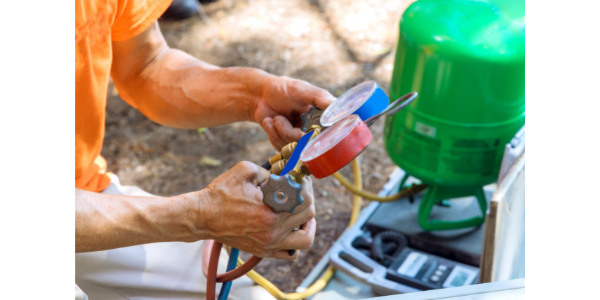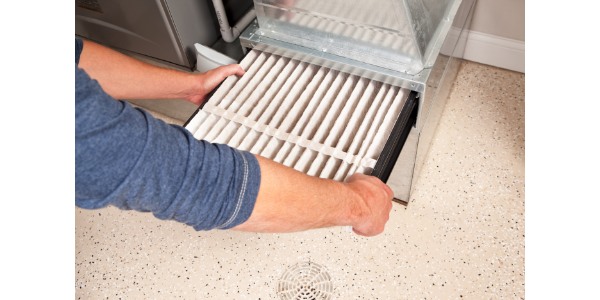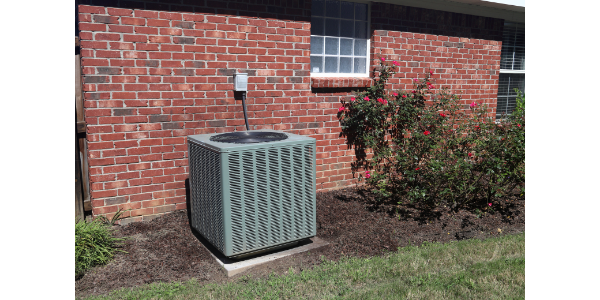When your HVAC system breaks down, you might be tempted to fix it yourself. You may want to have your heating or cooling system up and running as soon as possible without spending a lot of money. But pause for a moment. Repairing an air conditioner or furnace on your own is not as straightforward or affordable as it appears on YouTube. There are substantial risks and expenditures involved.
Learn about the risks of performing HVAC maintenance yourself, as well as a few things you can do safely to improve your system’s performance.
Why Isn’t It Worth It To Do Your Own HVAC Repair?
Do-it-yourself heating and air conditioning repairs can endanger your health, your wallet, and your system’s performance. Here are some of the most serious threats:
1. Errors that endanger your safety

In the hands of an untrained technician, residential HVAC, as peaceful and comfortable as it makes you and your family feel, comes with a host of potential “behind-the-scenes” concerns. They include:
Electric shock or death might result by touching the wrong electrical components.
A fire or explosion could occur if natural gas is handled incorrectly.
Poisoning can be caused by inhaling carbon monoxide or other gas pollutants from an improperly vented HVAC system.
Many of the crisis possibilities listed above could affect everyone in your home, not just the HVAC repair rookie.
2. Equipment Efficiency-Affecting Errors
Even if your repair hack gets your heating or cooling system up and running again, it may not be operating at peak efficiency. Unless you’re a qualified, experienced specialist, it’s easy to make mistakes when it comes to critical tasks like precisely regulating the temperature or maintaining proper circulation and drainage.
3. Inadequate Equipment and Parts

Don’t expect to get by with a screwdriver and a hammer alone. HVAC maintenance necessitates a variety of specialized tools and replacement parts, which must be updated on a regular basis as new HVAC technology emerges.
This equipment, as well as the training required to use it, is out of reach for the average person. Hiring professionals to service your HVAC is actually more cost effective than doing it yourself.
4. There are no warranties
Have you thoroughly examined your furnace and air conditioner warranties? They almost definitely have a clause stating that they are only valid if the equipment is professionally serviced and maintained. DIY can end up costing you a lot of money.
5. Repair Time Increases
HVAC repair should be done as fast (and as thoroughly) as feasible. Nobody wants to be without air conditioning during summer heatwaves, or a working furnace when it’s -20 degrees outdoors.
Experts in heating and air conditioning can diagnose your problem, offer the best solution, and finish the repair in the shortest period feasible. Troubleshooting, assembling your tools, disassembling the system, and so on would all take much longer if you did the same thing.
Do-It-Yourself Projects
You’ll be relieved to learn that there are various things you can — and should — do to maintain the health of your HVAC system. These are considered preventative maintenance rather than repairs.
Your Outside Air Conditioning Unit Should Be Cleaned
Dirt, twigs, leaves, and other debris from your yard can quickly clog your air conditioner’s condenser because it is outside. It is acceptable to clean the unit yourself. For further protection, trim back the foliage around the unit and make sure HVAC specialists can access it.
Filters Should Be Replaced

Airflow is essential for your system to function properly. Once a month, replace a disposable filter or clean a permanent one if it appears to be dirty and grey. At the very least, air filters should be updated every 90 days.
Insulation Can Be Installed Or Replaced
Your HVAC system will benefit from an increase in efficiency and energy savings if your insulation is in good shape. What are you waiting for if you haven’t insulated your home yet? If you already have insulation, make sure it is replaced if it is dusty or broken.
Repairs You Should Leave To The Experts
It’s a good idea to have all HVAC repairs done by professionals. Here are some noteworthy examples.
Leak of Refrigerant

Is R-22 refrigerant used in your air conditioner? Although Freon can theoretically stay indefinitely in a sealed HVAC system without evaporating or being exhausted, it can leak. In such scenario, forget about the DIY vs. HVAC professional debate. Only certified technicians are allowed to operate with ozone-depleting compounds.
Filthy Evaporator Coils
Dirt can get into your evaporator coils. It causes a range of problems, such as an air conditioner that runs continually or doesn’t cool and frozen coils. The lifespan of your air conditioner will decrease with time. Due to its inaccessibility, cleaning this location is difficult. The task can only be completed accurately by an expert.
Fans That Aren’t Working
Your air conditioner’s condenser unit features two fans, one inside and one outside. For an air conditioner to chill without freezing, they’re both essential. Fan repair should be conducted by a professional because of the sensitivity of the operation and the specialized parts involved, and since fan issues are usually serious, necessitating AC replacement.






GIPHY App Key not set. Please check settings